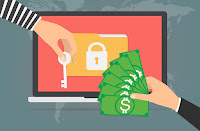Ransomware
The latest spin on a ransom note isn't composed of letters
clipped out of a newspaper. Now criminals are unleashing brash attacks on your
PC and its data through a type of malicious software called ransomware. Yes, I
am talking about the cyber-attack that wreaked havoc across the world over the
starting month of May 2016. By starting of the week ransomware had targeted
around 200,000 organizations in 150 countries. It is a kind of cyber-attack
that involves hackers taking control of a computer or mobile device and
demanding payment. More specifically it is for data kidnapping, an exploit in
which the attacker encrypts the victim's data and demands payment for the
decryption key, this program may also be called a cryptovirus, cryptotrojan or
cryptoworm.
What it actually does?
It uses Cerber to do so. Let me explain cerber a little it
is a is a ransomware-type malware that infiltrates the system and encrypts
various file types including .jpg, .doc, .raw, .avi, etc. Cerber adds a. cerber
extension to each encrypted file. Following successful infiltration, Cerber
demands a ransom payment to decrypt these files in a certain time in Bitcoins. Yes,
bitcoins not in Dollars or Euro. Actually Bitcoin is a cryptocurrency and a
digital payment system invented by an unknown programmer, or a group of
programmers, under the name Satoshi Nakamoto. It was released as open-source
software in 2009.
How transaction is made:
The system is peer-to-peer, and transactions take place between users directly, without an intermediary. These transactions are verified by network nodes and recorded in a public distributed ledger called the blockchain. Since the system works without a central repository or single administrator, bitcoin is called the first decentralized digital currency. You would be surprised to know that one Bitcoin is 194936.76 Pakistani rupees. Now we all have question arising in our head that how do we protect ourselves from this attack so here are simple short technique to follow:
· Use reputable antivirus
software and a firewall
·
Back up often
·
Enable your popup blocker
·
Exercise caution. Avoid
suspicious links
·
Alert authorities
·
Always install updates
And Never pay the ransom if possible as it encourages them
to grab more victims.
(Muhammad Adeel)


Good effort!
ReplyDeleteNice one!
ReplyDelete